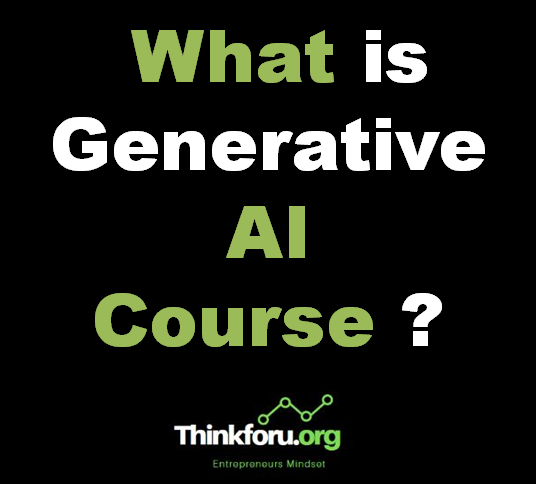What is Generative AI Course ?
What is Generative AI Course ?
A generative AI course typically refers to an educational program or training that focuses on teaching the principles, techniques, and applications of generative artificial intelligence. Generative AI involves creating models that can generate new content, such as images, text, music, or even videos, based on patterns and information learned from existing data.
Here's a breakdown of what you can expect from a generative AI course:
Fundamentals:
1. Understanding Generative AI: You'll learn the core concepts behind generative models, how they differ from traditional AI approaches, and their key applications across diverse fields.2. Techniques and Algorithms: Courses delve into various generative model techniques like Generative Adversarial Networks (GANs), Variational Autoencoders (VAEs), and transformers, exploring their strengths and weaknesses.3. Data Preparation and Training: You'll gain insights into preparing different types of data for generative models and the training process involved, including hyperparameter tuning and optimization.
Applications and Projects:
4. Text Generation: Learn how to create realistic and coherent text formats like poems, scripts, or even code using language models.5.Image and Audio Generation: Explore generating new images, music, or videos with tools like GANs and autoencoders, potentially for creative applications.6. Real-world Use Cases: Many courses showcase practical applications of generative AI in fields like drug discovery, material design, or personalized marketing, helping you understand its impact.
Choosing a Course:
The best course for you depends on your background and goals. Here are some factors to consider:7. Your experience: Beginner courses focus on basic concepts, while advanced courses delve into complex algorithms and research.8. Your learning style: Some courses offer interactive projects, while others focus on theoretical understanding.9. Your specific interests: Choose a course that aligns with your desired application of generative AI, like creative content generation or scientific research.
Here are some popular platforms offering generative AI courses:
Popular Resources:
10. Coursera: Offers courses like "Generative AI with Large Language Models" and "Introduction to Generative AI."11. Udemy: Provides various courses on generative AI, including "Top Generative AI (GenAI) Courses Online."12. DeepLearning.AI: Features courses like "Generative AI for Everyone" and "Generative AI with TensorFlow 2."13. Google Cloud: Offers "Introduction to Generative AI" and "Generative AI with Vertex AI: Getting Started."
Here are some additional aspects and topics that might be covered in a generative AI course:
14.Transfer Learning: Understanding how pre-trained models can be adapted and fine-tuned for specific generative tasks, leveraging knowledge learned from one domain to another.
15. Text-to-Image Synthesis: Exploring techniques for generating realistic images from textual descriptions, a challenging task within the realm of generative AI.
16. Conditional Generation: Learning how to condition generative models on specific input, allowing for controlled and targeted content generation.
17. Hyperparameter Tuning: Understanding the importance of tuning model hyperparameters for optimal performance, as different generative tasks may require specific parameter configurations.
18. Evaluation Metrics: Exploring metrics and methods for assessing the quality of generated content, which is crucial for understanding the effectiveness of generative models.
19. Deployment Considerations: Discussing considerations for deploying generative models in real-world applications, including computational requirements, scalability, and integration with existing systems.
20. Collaborative and Creative AI: Exploring how generative models can be used in collaborative and creative processes, such as in art, music, and content creation.
21. Research Trends: Staying updated on the latest research trends and breakthroughs in generative AI, as the field is dynamic and continuously evolving.
22. Industry Applications: Examining how generative AI is being applied in various industries, such as healthcare, entertainment, finance, and more.
23. Interdisciplinary Perspectives: Recognizing the interdisciplinary nature of generative AI and its connections with fields like cognitive science, linguistics, and psychology.
24. Practical Challenges: Discussing common challenges faced in generative AI projects, such as mode collapse in GANs, and strategies for overcoming these challenges.
The specific content of a generative AI course can vary depending on the instructor, the level of the course (introductory, intermediate, advanced), and the intended audience (e.g., students, industry professionals). It's always a good idea to review the course syllabus or curriculum to understand the specific topics covered.
The field of generative AI is rapidly evolving, so staying updated with the latest advancements is crucial. By choosing the right course and actively learning, you can unlock the potential of this powerful technology and contribute to its future development.
More Related to Generative AI
What is Generative AI Google
What is Generative AI vs Discriminative AI
